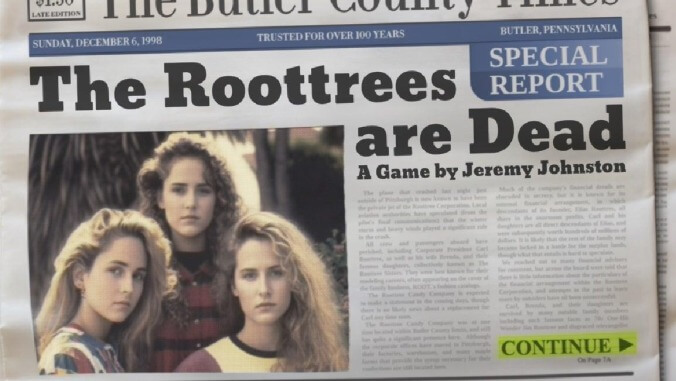Game Theory: Every internet detective should be playing The Roottrees Are Dead
A new, free browser-based game about amateur genealogy is one of the best detective games we've played all year

Every Friday, A.V. Club staffers kick off the weekend by taking a look at the world of gaming, diving in to the ideas that underpin the hobby we love with a bit of Game Theory. We’ll sound off in the space above, and invite you to respond down in the comments, telling us what you’re playing this weekend, and what theories it’s got you kicking around.
We’ve written many times in this space about the pleasures of playing a good detective game. “Detecting” is one of the best verbs a video game can test for; it’s right up there with “jumping,” or “hitting the R button to reload the gun any time there’s even a second of downtime, even though we only fired a single bullet.” (Everybody does that, right? S’not just us?) The great thing about a good detective game, though, is that it doesn’t test for abstract skills, but practical ones; titles like Dark Souls might teach you how to swing a sword in Dark Souls, but a really top-notch mystery game like Paradise Killer, The Return Of The Obra Dinn, or the Phoenix Wright games tests your ability to understand a set of information and draw logical conclusions from it, fantastical reality or not.
Hence our recent delight at The Roottrees Are Dead, a new online detective game by Jeremy Johnston, that tasks players with becoming something they might very well already be: Armchair detectives, cracking cases from the comfort of their computers. The set up is fairly straightforward: Several members of prominent candy manufacturing family the Roottrees have (spoilers) died, and you’ve been hired to work out the clan’s complicated genealogy, starting with its most famous members and then sleuthing out from there. The actual gameplay, then, is a matter of dedicated and varied Googling, using a facsimile of 1990s internet to root out the names, jobs, and pictures of the entire crew, and then plugging them into the big tree.
It sounds simple enough, but the mass of information, and the various dead ends you keep running into, prove trickier to overcome than most. (Justified by the dismal state of search engines back at the end of the 20th century, making looking up basic biographical details a lot harder than it would be now.) Oh, but what a pleasure it is to slowly put together a picture of the family’s complicated situation, understanding why one cousin fell out with another, or teasing out smaller mysteries (like who divorced who, or which jerkward doctor cousin-in-law was trying to glom on to the family name to get himself a little heat). Obra Dinn is the obvious reference point, and much like Lukas Pope’s 2018 masterpiece, the pleasure here is in finding the tiny breadcrumbs of logic that can lead to a correct supposition. (And the incredibly satisfying moment when the game confirms your better-than-guesswork.) Although it’s relatively short, it’s also the sort of game to keep you up at night, teasing at different ways to get the game to cough up that one vital piece of info that’ll tie the whole thing together.
So, yeah: It’s lovely (give or take your stance on AI-generated art to make the images), it’s free, it’s shockingly polished—and if you have a weakness for unraveling a good mystery with some dedicated (faux) Google-fu, it’s pretty much impossible not to recommend. Check it out here.